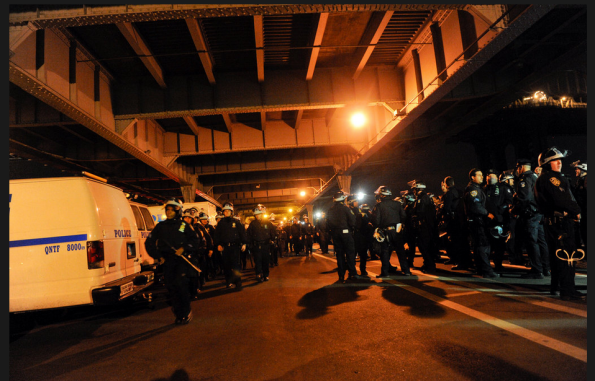Is mathbabe a terrorist or a lazy hippy? (#OWS)
The Occupy narrative, put forth by mainstream media such as the New York Times and led by friends of Wall Street such as Andrew Ross Sorkin, is sad and pathetic. A bunch of lazy hippies, with nothing much in the way of organized demands, and, by the way, nothing much in the way of reasonable grievances either. And moreover, according to Sorkin, Occupy had fizzled as of its first anniversary.
To an earnest reader of the New York Times, in other words, there’s no there there, and we can move on. Nothing to see.
From my perspective as an active occupier, this approach of casual indifference has seemed oddly inconsistent with the interest in the #OWS Alternative Banking group from other nations. I’ve been interviewed by mainstream reporters from the UK, Belgium, Canada, France, Germany, and Japan, and none of them seemed as willing to dismiss the movement or our group quite as actively as the New York Times has.
And then there was the country-wide clearing of the parks, which seemed mysteriously coordinated, and the press (yes, the New York Times again) knowing when and where it would happen somehow, and taking pictures of the police gathering beforehand.
Really it was enough to make one consider a conspiracy theory between the authorities and mainstream media.
I’m not one for conspiracy theories, though, so I let it pass. But other people were more vigilant than myself after the coordinated clearings, and, as I learned from this Naked Capitalism post, first Truthout attempted a FOIA request to the FBI, and was told that “no documents related to its infiltration of Occupy Wall Street existed at all”, and then the Partnership for Civil Justice filed a FOIA request which was served.
Turns out there was quite a bit of worry about Occupy among the FBI, and Homeland Security, even before Zuccotti was occupied. Occupy was dubbed a terrorist organization, for example. See the heavily redacted details here.
I guess to some extent this makes sense, as the roots of Occupy are outwardly anarchist, and there is a history of anarchist bombings of the New York Stock Exchange. I guess this could also explain the meetings the FBI and Homeland Security had with the banks and the stock exchange. They wanted to cover their asses in case the anarchists were violent.
On the other hand, by the time they cleared the park the movement was openly peaceful. You don’t get called lazy dirty hippies because you’re throwing bombs into buildings, after all. And the coordination of the clearing of the parks is no longer a conspiracy, it’s verified. They were clearly afraid of us.
So which is it, lazy hippy or scary terrorist? There’s a baffling disconnect.
The truth, in this case, is not in between. Instead, Occupy lives in a different plane altogether, as I’ll explain, and this in turn explains both the “lazy” and the “scary” narrative.
The “lazy” can be put to rest here and now, it’s just wrong. The response and relief efforts of Occupy Sandy has convincingly shown that laziness is not an underlying principle of Occupy.
But Occupy Sandy did expose some principles that we occupiers have known to be true since the beginning:
- that we must overcome or even ignore structured and rigid rules to help one another at a human level,
- that we must connect directly with suffering and organically respond to it as we each know how to, depending on circumstances, and
- that moral and ethical responsibilities are just plain more important than rules.
Such a nuanced concept might seem, from the outside, to be a bunch of meditating hippies, although you’d have to kind of want to see that to think that’s all it is. So that explains the “lazy” narrative to me: if you don’t understand it, and if you don’t want to bother to look carefully, then just describe the surface characteristics.
Second, the “scary” part is right, but it’s not scary in the sense of guns and bombs – but since the cops, the FBI, and Homeland Security speak in that language, the actual threat of Occupy is again lost in translation.
It’s our ideas that threaten, not our violence. We ignore the rules, when they oppress and when they make no sense and when they serve to entrench an already entrenched elite. And ignoring rules is sometimes more threatening than breaking them.
Is mathbabe a terrorist? Is the Alternative Banking group a threat to national security because we discuss breaking up the big banks without worrying about pissing off major campaign contributors?
I hope we are a threat, but not to national security, and not by bombs or guns, but by making logical and moral sense and consistently challenging a rigged system.
I’m planning to file a FOIA request on myself and on the Alt Banking group to see what’s up.





One man’s terrorist is another man’s lazy hippie.
There is a bit of a parallel here to the union movement. First it was beaten down with hired ‘police’ and thugs (where many were just outright murdered so I guess we have to be thankful that didn’t happen today), then the propaganda campaign through the Capitalist press, then the unions took hold and workers thrived for about 50 years.
LikeLike
If you’re a terrorist, then I’m Santa Claus… Ho, Ho, Ho (Chi Min?)
LikeLike
If you’re Santa Claus then I’m Babe the Blue Ox… Moo, Moo, Moo (goo gai pan?)
LikeLike
Sorkin occasionally writes things that seem meant to ingratiate himself to his sources, and his cheap shot at OWS is among them. Does he matter? Meanwhile, movements either join the political horseraces that the media are organized to “cover” or else engage in an extended series of probing actions whose inner logic can probably never fit an editor’s sense of the public narrative until some fact on the ground forces that to change. Occupy has chosen the latter, and as long as the actions are intrinsically worthwhile, leave supporters feeling empowered, and build organization of some useful kind, it’s doing just fine. News organizations see themselves as trustees of public narratives that need protection; movements want to change those, but need time and experimentation to discover new ones that do less harm and attract broad support. Have you talked to the Financial Times?
LikeLike
Good luck with the FOIA request!
LikeLike
So early morning October 9 2011 I took a ride up to McPherson Square in DC where an OWS camp was set up to get a feel for the movement. I took pictures of many of the signs that were set up. The messages were anything but ambiguous — “Bring back Glass-Stegall,” “Overturn: Ross v Berhard, Buckley v Valeo, 1st Nat. Bank v Bellotti, Marshall v Barlow, Cit. Utd. v FEC” (with an explaination of what each did) and a lot of similar sentiments. Watching the media pretend that OWS had no message was infuriating.
LikeLike
Yeah, about that “ignoring rules” thing: I think gun owners will do the same thing when they feel gun control is oppressive and make no sense.
LikeLike
That’s a really good point, and it illustrates yet another bad side effect of having a system that is internally corrupt – there are all sorts of ways to rebel against such a system, some of them more violent than others.
LikeLike
I’m interested in the mindset and moral justifications of media hacks and others who from time to time promote, do psy-ops or are the foot-soldiers or planners for an (arguably) unfair economic system. There’s a best-seller by John Perkins named: “Confessions of an Economic Hit Man”. I’m curious to peruse Perkins’s book and read or hear more from John Perkins so as to better understand possible answers to my question on mindset and/or moral justifications. My first guess is that (a) the love of money and wealth and (b) rugged individualism to the point of not caring about outcomes to others in society (as with Ayn Rand) , are both strong forces in maintaining the status quo.
LikeLike
any activity which challenges the legitimacy of the system as presently constituted is a threat to the continued operation of the gravy train, threatening to remove the biscuit wheels from the bacon rails.
LikeLike
Here’s an oceangoing version: if mega container ships also carry symbolism, then it probably resides mostly in their momentum and the amount of force required to alter it.
LikeLike
I think you’re making the unwarranted assumption that civil disobedience by would-be gun purchasers will be “more violent” than OWS was. It might very well just take the form of clandestine purchases and a thriving black market in banned weapons. I don’t own a firearm, either – but I don’t automatically attribute violent inclinations to those who do. Given that 47% of US households self-report ownership of at least one firearm, I don’t think such an assumption is supported by the data.
LikeLike